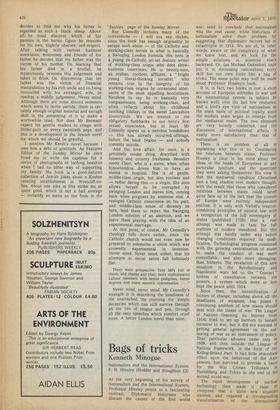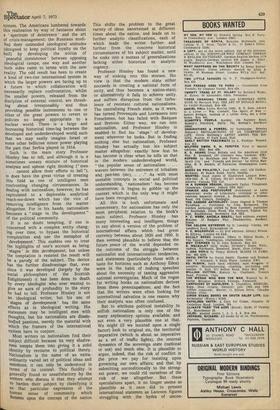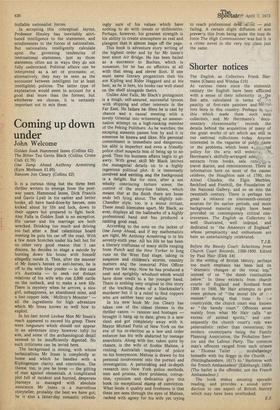Bags of tricks
Kenneth Minogue
Nationalism and the International System F. H. Hinsley (Hodder and Stoughton £3)
At the very beginning of his survey of Nationalism and the International System, Professor Hinsley points to a fascinating contrast. Diplomatic historians who discuss the causes of the first world
war, tend to conclude that nationalism was the real cause, while historians of nationalism solve their problem bY suggesting that diplomatic factors led to catastrophe in 1914. We are all, in other words, aware of the complexity of what we know best, and we look for the simple solutions in someone else's backyard. Or, (as Michael Oakeshott once put it in discussing rationalism) every skill but our own looks like a bag of tricks. The same point may well be made about Professor Hinsley's book.
It is, in fact, two books in one: a short account of European attitudes to war and the international system (a subject he knows well) over the last few centuries; and a bird's eye view of nationalism as the main basis of political loyalty since the modern state began to emerge from the mediaeval realm. The two elements are very loosely connected, and the discussion of international affairs is vastly more satisfactory than that of nationalism.
There i no problem at all in explaining why this is so. Considering the relations between states, Professor Hinsley is clear in his mind about the ideas in the heads of Europeans at any particular juncture, and the questions they were asking themselves. His view is that the mediaeval republica Christiana cast a long shadow over modern thought, with the result that those who considered relations between states could never quite face up to the fact that the powers of Europe were entirely independent entities. It is only with Vattel's treatise, combining principles of natural law with a recognition of the full sovereignty of states (published 1758) that a real attempt was made to face the full realities of modern statehood. But this attempt was hardly under way before changing conditions required its modification. Technological progress combined with the growing centralisation of states to make the conduct of war more controllable, and also more damaging, than hitherto. The revelation of this neW situation in the Revolutionary and Napoleonic wars led to the " Concert " system of consultation between the powers, a system which more or less kept the peace until 1914.
Since then, the intensification of factors of change, including above all the deadliness of weapons, has posed a continuing problem of how states should deal with the threat of war. The League of Nations (learning its lessons from 1914) tried to set up barriers to instant recourse to war, but it did not succeed in getting general agreement on the out. !awing of war as an instrument of policY. That particular advance came only in 1928, and then outside the League of Nations framework, in the form of the Kellog-Briand Pact. It had little immediate effect upon the behaviour of the Axis powers, but survived to provide a basis for the War Crimes Tribunals in Nuremberg and Tokyo at the end of the second world war.
The rapid development of nuclear technology then made it clear to everyone that a quite new situation existed, and required a corresponding transformation of the international system. The Americans lumbered towards this realisation by way of fantasies about a ' spectrum of deterrence ' and the art of crisis-management; the Russians modified their outmoded ideological attitudes (designed to keep political loyalty on the boil) by developing the notion of 'peaceful coexistence' between opposing ideological camps; one way and another both sides came to terms with the new reality. The odd result has been to create a kind of two-tier international system in Which the larger powers are facing up to a future in which collaboration will necessarily replace confrontation, whilst the smaller powers, released from the discipline of external control, are threshing about irresponsibly and thus providing possible incitements to one or other of the great powers to revert to Policies no longer appropriate to a nuclear world. There is a large and increasing historical time-lag between the developed and underdeveloped world such that we may easily imagine Israel or some other bellicose minor power playing the part that Serbia played in 1914.
Such is the main story Professor Hinsley has to tell, and although it is a sometimes uneasy mixture of historical analysis and upbeat right thinking (" men . . . cannot allow their efforts to fail "), is does have the great virtue of treating this field as one of intelligent men confronting changing circumstances. In dealing with nationalism, however, he has capitulated to a deplorable analytical reach-me-down which has the vice of removing intelligence from the matter altogether. For in his hands, nationalism becomes a "stage in the development" of the political community.
It is no doubt tempting, if one is concerned with a complex entity changing over time, to bypass the historical complexities and use the metaphor of ' development.' This enables one to treat the highlights of one's account as being ' stages ' in this development; but unless the temptation is resisted the result will be a parody of the subject. The device has the further disadvantage that, ever since it was developed (largely by the social philosophers of the Scottish Enlightment) it has been done to death by every ideologist who ever wanted to give an aura of profundity to the story he had to tell. Professor Hinsley is not an ideological writer, but his use of Stages of development ' has the same effects as in ideological writing. His statesmen may be intelligent men with thoughts, but his nationalists are disembodied passions, merely the material with Which the framers of the international System have to conjure.
Most writers on nationalism find their subject difficult because its very elusive ness tempts them into giving it a solid Identity by recourse to political theory. Nationalism is the name of an extraordinarily varied set of political ideas and emotions; it can only be understood in terms of its context. This fluidity is generally found so unsatisfactory by the writers Who discuss it that they attempt to harden their subject by classifying it as that particular expression of the human sense of community which focuses upon the concept of the nation. This shifts the problem to the great variety of ideas entertained at different times about the nation, and leads on to further analytic classifications, each of which leads the writer further and further from the concrete historical circumstances of his subject matter, until he sinks into a morass of generalisations lacking either historical or analytic cogency.
Professor Hinsley has found a new way of sinking into this morass. His view is that the modern state either succeeds in creating a national form of unity, and thus becomes a nation-state; or alternatively it fails to achieve unity, and suffers disruption from the turbulence of resistant cultural nationalisms. The centralising French state, as it were, has turned Provencals and Lorrainers into Frenchmen, •but has failed with Basques and Bretons. Either way, we run into nationalism, and Professor Hinsley is enabled to find his ' stage ' of development wherever he looks. But in finding nothing else but nationalism, Professor Hinsley has actually lost his subject matter altogether: exactly how lost he has become is clear when he tells us that in the modern underdeveloped world., 'the popular sense of nationalism . . . wavers between the extremes of tribalism and pan-ism (sic), . . ." As with most unstable concepts in social and political understanding, ' nationalism ' has become omnivorous; it begins to gobble up the context which is the only way it might have been recognised.
All this is both unfortunate and unnecessary, for nationalism has only the most peripheral relation to the book's main subject. Professor Hinsley has many interesting and intelligent things to say about a version of the problem of international affairs which had great currency between about 1920 and 1950. It then seemed plausible to believe that the future peace of the world depended on the outcome of the struggle between nationalist and internationalist tendencies, and statesmen (particularly those with a taste for horizons such as Anthony Eden) were in the habit of making speeches about the necessity of taming aggressive national sovereignties. Much of the vogue for writing books on nationalism derives from these preoccupations; and the fact that the writers were often looking for international salvation is one reason why their analysis was often confused.
But to attribute political instability to selfish nationalism is only one of the many explanatory options available; and not even a very plausible one at that. We might (if we insisted upon a single factor) look to original sin, the territorial imperative (which is about as imperative as a set of traffic lights), the internal dynamics of the sovereign state (national or not) and much else. It is plausible to argue, indeed, that the risk of conflict is the price we pay for insisting upon governing our own affairs; and that by submitting unconditionally to the strongest power, we could rid ourselves of the risk of war altogether. But these speculations apart, it no longer seems as plausible as it once did to present international statemen as Laocoon figures struggling with the hydra of uncon trollable nationalist forces.
In accepting this conceptual layout, Professor Hinsley has inevitably attributed intelligence to the statesmen, and mindlessness to the forces of nationalism. But nationalists intelligently calculate upon the governing tendencies of international statesmen, just as those statesmen often act in ways they do not fully understand. Political affairs can be interpreted as a set of processes; or, alternatively, they may be seen as the encounter between intelligent (or at least intelligible) policies. The latter type of explanation would seem to account for a good deal 'more than the former; but whichever we choose, it is certainly important not to mix them.




































 Previous page
Previous page